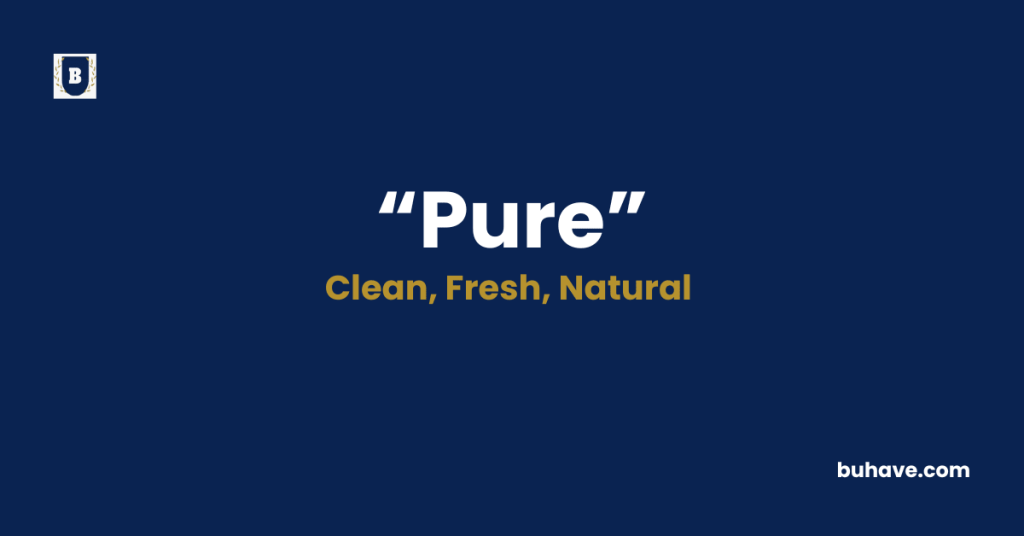The word ‘Pure’ (Adjective) describes something that is free from any contamination, mixture, or impurity—physically, morally, or conceptually. In this guide, you’ll learn the full definition, synonyms, antonyms, etymology, and real-life examples of how to use ‘Pure’ correctly in sentences.
Pure Explained in Depth
A complete and detailed guide to the word Pure including meaning, definition, examples, etymology, synonyms, and antonyms.
Meanings of Pure
The word pure refers to something that exists in its original, uncontaminated, or unaltered state. It can describe physical substances, such as pure water or pure gold, which are not mixed with any other elements or compounds. In this sense, purity emphasizes cleanliness, authenticity, and the absence of foreign or impure components. However, “pure” also carries significant emotional and moral implications. For example, a pure heart is one that is free from malice, deceit, or corruption—marked instead by kindness, sincerity, and integrity.
In broader usage, pure can describe ideas, emotions, or experiences that are untainted or genuine. Love, for instance, is often described as pure when it’s unconditional and sincere. In mathematics or science, something pure might mean undiluted or abstract in form, such as pure mathematics. It can also denote simplicity and clarity, free from unnecessary complexity or distraction.
Thus, pure is a versatile adjective that expresses a sense of untouched, refined, or idealized condition in various contexts whether in materials, character, intentions, or experiences.
Definition
“Pure” is defined as being untainted, unmixed, or uncontaminated by extraneous matter. It refers to a condition or quality that is pristine, flawless, and in its most authentic form. This term is commonly applied to describe materials that are not diluted or altered by additional substances, such as pure silver or pure oxygen. However, it also extends metaphorically to behaviors, intentions, and emotions that are genuine, innocent, or virtuous.
Purity, in the moral or emotional sense, often reflects ideals of honesty, goodness, and sincerity. For example, someone with pure motives is acting without selfishness or hidden agendas. In religious or spiritual contexts, purity can denote a state of grace or spiritual cleanliness. This multifaceted definition makes “pure” an expressive word that touches both tangible and intangible aspects of life—valuing what is original, honest, and undefiled in form or spirit. In literature and everyday speech, using “pure” often elevates the object or quality being described, imbuing it with respect, admiration, or reverence.
Etymology
The etymology of the word “pure” can be traced back to its Latin and Old French roots, both of which emphasize cleanliness, simplicity, and authenticity. Here’s how the word evolved:
- Latin: The word originates from the Latin term purus, meaning “clean, clear, unmixed, or unadulterated.” In classical Latin, purus could be used to describe physical cleanliness or moral integrity.
- Old French: The word passed into Old French as pur, retaining the meanings of “clear” and “simple.”
- Middle English: The English form “pure” entered the language during the Middle English period through Old French, keeping its emphasis on being free from dirt, guilt, or foreign matter.
The original Latin root purus is also related to the Proto-Indo-European root *peue-, which means “to purify” or “to clean.” Over centuries, “pure” expanded its application from strictly physical cleanliness to include moral, emotional, and even abstract forms of refinement and sincerity. Its historical consistency in meaning reinforces the deep cultural value placed on purity as a concept across languages and societies.
Example Sentences
- The mountain stream provided pure water, untouched by pollution or industrial waste.
- Her pure intentions were evident in every kind and selfless act she performed.
- This ring is made of pure gold, ensuring its lasting value and authenticity.
- They shared a moment of pure joy when they reunited after many years apart.
- Pure science focuses on expanding knowledge without immediate practical application.
Pure Synonyms
- Unmixed
- Unadulterated
- Genuine
- Innocent
- Clean
- Uncontaminated
- Authentic
- Virtuous
- Refined
- Pristine
Pure Antonyms
- Contaminated
- Impure
- Adulterated
- Corrupt
- Tainted
- Sullied
- Mixed
- Dirty
- Dishonest
- Polluted
FAQs about Pure
Here are some frequently asked questions (FAQs) about the word “Pure”
1. What does “pure” mean in simple terms?
“Pure” means clean, genuine, or not mixed with anything else. It can describe both physical and emotional qualities.
2. Can “pure” describe a person?
Yes, when describing a person, “pure” often refers to their innocence, honesty, or sincerity in motives or character.
3. Is “pure” always a positive word?
Generally, yes. “Pure” carries a positive connotation, often associated with goodness, clarity, and authenticity.
4. What’s the difference between “pure” and “clean”?
“Clean” typically refers to the absence of dirt or mess, while “pure” emphasizes being uncontaminated or unaltered, sometimes morally or chemically.
5. What is the opposite of “pure”?
The opposite of “pure” is “impure,” which means mixed, tainted, or contaminated in some way—physically, morally, or emotionally.

















